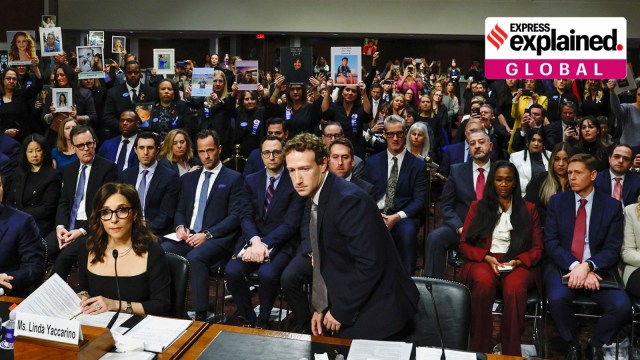The CEOs of global tech giants Meta (earlier called Facebook), X (earlier called Twitter), Snap (earlier called Snapchat), TikTok and Discord attended a US Senate hearing on Wednesday (January 31), on the companies’ supposed failures in protecting kids online.
Parents of children who allegedly suffered because of these platforms’ policies were also present. Speaking to the press later, they spoke of the dangers children face online – from content that encourages harmful body standards to the prevalence of material related to child abuse. Many of the parents carried placards with photos of their children, some of whom died by suicide.

At one point in the hearing, Republican Senator Josh Hawley questioned whether Meta CEO Mark Zuckerberg had personally compensated any of the victims and their families. “I don’t think so,” Zuckerberg replied. “There’s families of victims here,” Hawley said. “Would you like to apologise to them?” Zuckerberg stood and faced the parents in the gallery. “I’m sorry for everything you have all been through. No one should go through the things that your families have suffered,” he said.
What was the hearing for Tech CEOs about?
The US Senate’s Committee on the Judiciary, which often acts as a forum for public discussion, held the hearing. Its website said, “The bipartisan hearing marks the first time a group of Big Tech CEOs will testify on online child sexual exploitation, including three first-time Congressional testimonies from the CEOs of X, Snap, and Discord.”
Several tech leaders, including Zuckerberg, have appeared in front of the US Congress previously on matters ranging from misinformation on social media platforms to non-consensual sharing of user data.
At the hearing, both Democratic and Republican senators questioned the CEOs over what their platforms are doing to protect children online, arguing that not enough safeguards have been instituted.
Republican Senator Ted Cruz questioned Meta’s policies on content related to child sexual abuse. He said when a user searches for such content on Instagram, a cautionary pop-up message appears on the screen and gives them two options – to “get resources” or “see results anyway”. Cruz questioned why the second option was given at all, saying “Mr Zuckerberg, what the hell were you thinking?”
Story continues below this ad
Republican Senator Lindsay Graham, the top Republican on the Judiciary panel, said he was ready to undertake bipartisan efforts on a solution to the issue. “Social media companies as they’re currently designed and operate are dangerous products,” Graham said. Democrat and New Mexico Attorney General Raúl Torrez said, “When it comes to how these companies have failed to prioritise the safety of children, there’s clearly a sense of frustration on both sides of the aisle.”
What have parents alleged about these tech companies?
Parents and guardians at the meeting spoke with the Associated Press, saying companies need to do more when dealing with sexual predators online, apps’ addictive features, and content that can lead to thoughts of suicide and eating disorders with unrealistic beauty standards on display.
A significant share of these apps’ audience is young adults and teenagers. A recent Pew Research survey found that 78% of 18- to 29-year-olds in the US say they use Instagram, far higher than the share among those 65 and older (15%). 65% of US adults under 30 report using Snapchat, compared with just 4% of the oldest age cohort. 62% of 18- to 29-year-olds say they use TikTok.
Neveen Radwan, a parent, said her teenage daughter started looking at videos on healthy eating and exercise during the Covid-19 lockdowns. Radwan told AP that she then developed anorexia within a few months and “nearly died”.
Story continues below this ad
And how have companies responded?
Largely, the CEOs maintained that they are doing their best to enforce existing policies, such as not allowing children under the age of 13 on apps and expanding teams to look at the well-being of children.
Notably, in India, a 2021 survey by the National Commission For Protection of Child Rights (NCPCR) found that 37.8% and 24.3% of 10-year-old children have Facebook and Instagram accounts respectively, despite the age limit prohibiting account creation.
Snap CEO Evan Speigel said the company will support a nationwide Bill to create legal liability for apps and social platforms that recommend harmful content to minors. X CEO Linda Yaccarino said the app did not cater to children. She said X will also support a Bill that makes it easier for victims of child exploitation to sue tech companies.
What explains this scrutiny from US politicians?
Story continues below this ad
It comes on the back of several other instances in recent years, where the power social media apps wield has come under scrutiny. In 2017, the Blue Whale challenge made headlines for reportedly encouraging people to follow steps similar to other internet challenges, performing a task per day for a specific period. But these tasks were violent and ended in the “participant” being told to kill themselves at the end of it.
In 2018, it was found that Facebook allowed around 87 million Facebook users’ data to be shared with third parties. This included the political analysis firm Cambridge Analytica, which was linked to Donald Trump’s Presidential campaign in 2016.
Last year, 33 US states said Meta “misled” the public about the dangers of its platforms, and knowingly induced young children and teenagers into addictive and compulsive social media use. They have filed a lawsuit against the company.
A bipartisan Bill called the Kids Online Safety Act (KOSA) was recently introduced in the US Congress. CEOs were asked whether they would support the Bill, and the X and Snap CEOs agreed, while Meta, TikTok and Discord CEOs said they would not support it in its current form.
Story continues below this ad
Some critics say that certain provisions of the Bill can greatly restrict free speech. Requiring users to verify their ages through government-issued ID cards could “threaten users’ privacy, including through the risk of data breaches, and chill their willingness to access sensitive information online because they cannot do so anonymously,” said an open letter that included signatories like the American Civil Liberties Union (ACLU).
(With AP inputs)








































